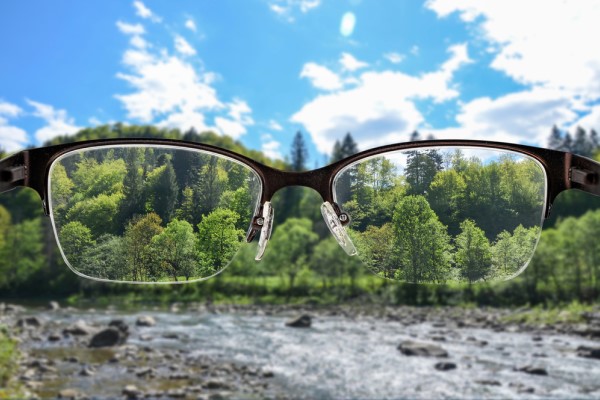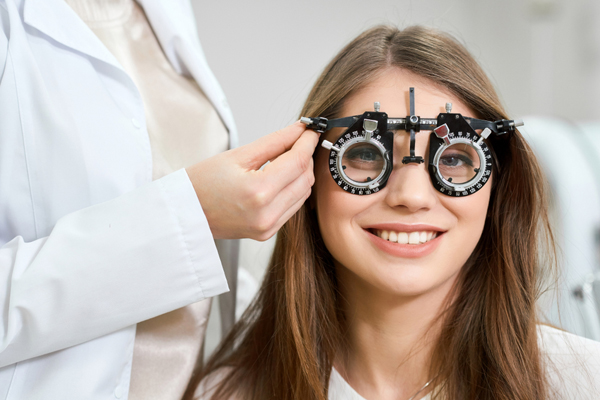Nearsighted Versus Farsighted Vision

Many people are usually nearsighted or farsighted. These are common types of vision problems. Both of them are caused by abnormalities of the eye that make it hard for light to be focused properly on the retina. These conditions have many similarities and differences. If you think you may be nearsighted or farsighted, read on to learn more about these vision problems.
Nearsighted and farsighted vision
Myopia and hyperopia are both common types of refractive errors. A refractive error is when the eye does not bend or refract light properly. Since light is not focused, images are not clear or appear blurred. These conditions have similar symptoms, causes and can both be treated the same way. However, there are slight differences between them especially with vision clarity depending on the distance.
Causes
Myopia or nearsightedness is a condition in which individuals can see objects that are close to them clearly but objects that are far away are not clear and appear blurred. People with this condition find it hard to read road signs or see a movie unless they go closer to the sign or TV. Myopia happens when the cornea is very steep or if the eyeball is very long. Here, the structure of the eye makes it hard for the light that enters the eye to be focused properly. As a result, images focus in front of the retina rather than directly on it.
Hyperopia or farsightedness is a condition in which distant objects can be seen well but a person finds it hard to see close objects. A person with this condition usually finds it difficult to focus clearly on objects that are near. Hyperopia occurs when light rays are not focused the way they should by the eyes. In this case, images are focused on the wrong place, beyond the retina. It normally happens if the eye is too short or not powerful enough to focus the image.
Symptoms
These conditions share similar symptoms. These include eye strain, blurry vision, fatigue and headaches. The major difference is that for a person with myopia distant objects are blurred whereas for a person with hyperopia everything may get blurry up close. People who experience these symptoms should contact an optometrist. All it takes to diagnose any of them is a basic eye exam.
Treatment
Both hyperopia and myopia can be treated with contact lenses, glasses or refractive surgery. For myopia refractive surgery involves reducing the cornea’s curvature so that the focusing power of the lens reduces. With hyperopia, refractive surgery is done to attain a steeper cornea so that the focusing power of the eye increases. In both cases, the goal of surgery is to ensure images are pushed directly onto or near the retina.
Next step
Myopia and hyperopia are both caused by some irregularity in the shape of the cornea or eyeball. These conditions interfere with people’s daily lives. Fortunately, regardless of the condition you have, your vision can be improved by refractive surgery or by wearing contacts or glasses. To determine if you are nearsighted or farsighted, schedule an eye exam with your eye doctor.
Request an appointment here: https://brighteyesmv.com or call Bright Eyes Optometry at (914) 668-1429 for an appointment in our Mt Vernon office.
Check out what others are saying about our services on Yelp: Optometry in Mt Vernon, NY.
Recent Posts
Emergency eye care is needed if you find yourself dealing with a problem with your eye that causes pain or affects your vision. Failing to treat eye injuries as soon as they are detected can lead to permanent consequences, like reduced vision or blindness. Common eye injuries that require emergency eye care include: Exposure to…
Looking for more information on eye protection? An ophthalmologist knows everything there is to know about protecting the eyes. While there are a few different types of eye care professionals, ophthalmologists are eye care professionals who have undergone additional years of education and training so they can offer their patients both medical and surgical eye…
Controlling myopia at an early age can slow down its progression. This can help prevent yearly upgrades for stronger glasses. Your optometrist can help by offering various treatments. If you want to find out how your optometrist can help control myopia, here are the details.Optometrists use atropine eye drops to achieve short-term myopia control results.…
Another word for an itchy eye is ocular pruritis. It is a common health situation in many people. Itchiness in your eyes is more than enough reason to see an optometrist. Receiving prompt treatment is important in receiving prompt relief. If you want to know what causes an itchy eye and the treatments for it,…



